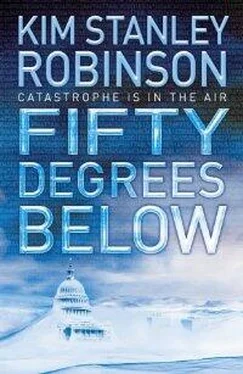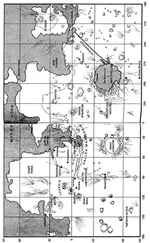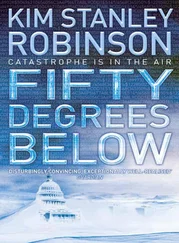It was a strange sensation. He sat at the kitchen counter in the dusk, strewn with the various sections of the Post. The “Apartments for Rent” section was less than a column long, and Frank had learned enough of its code by now to know that it held nothing for him. More interesting had been an article in the day’s Metro section about Rock Creek Park. Officially closed due to severe flood damage, it was apparently too large for the overextended National Park Service to be able to enforce the edict. As a result the park had become something of a no-man’s land, “a return to wilderness,” as the article had put it.
Frank surveyed the apartment. It held no more memories for him than a hotel room, as he had done nothing but sleep there. That was all he had needed out of a home, his life proper having been put on hold until his return to San Diego. Now, well… it was like some kind of premature resuscitation, on a voyage between the stars. Time to wake up, time to leave the deep freeze and find out where he was.
He got up and went down to his car.
Out to the Beltway to circle north and then east, past the elongated Mormon temple and the great overpass graffiti referencing it: go home dorothy! Get off on Wisconsin, drive in toward the city. There was no particular reason for him to visit this part of town. Of course the Quiblers lived over here, but that couldn’t be it.
He kept thinking: Homeless person, homeless person. You are a homeless person. A song from Paul Simon’s Graceland came to him, the one where one of the South African groups kept singing, Homeless; homeless, Da da da, da da da da da da … something like, Midnight come, and then you wanna go home. Or maybe it was a Zulu phrase. Or maybe, as he seemed to hear now: Homeless; homeless; he go down to find another home.
Something like that. He came to the intersection at the Bethesda Metro stop, and suddenly it occurred to him why he might be there. Of course—this was where he had met the woman in the elevator. They had gotten stuck together coming up from the Metro: alone together underground, minute after minute, until after a long talk they had started kissing, much to Frank’s surprise. And then when the repair team had arrived and they were let out, the woman had disappeared without Frank learning anything about her, even her name. It made his heart pound just to remember it. Up there on the sidewalk to the right, beyond the red light—there stood the very elevator box they had emerged from. And then she had appeared to him again, on a boat in the Potomac during the height of the great flood. He had called her boat on his cell phone, and she had answered, had said, “I’ll call. I don’t know when.”
The red light turned green. She had not called and yet here he was, driving back to where they had met as if he might catch sight of her. Maybe he had even been thinking that if he found her, he would have a place to stay.
That was silly: an example of magical thinking at its most unrealistic. And he had to admit that in the past couple of weeks he had been looking for apartments in this area. So it was not just an isolated impulse, but a pattern of behavior.
Just past the intersection he turned into the Hyatt driveway. A valet approached and Frank said, “Do you know if there are any rooms available here?”
“Not if you don’t got a reservation.”
Frank hurried into the lobby to check anyway. A receptionist shook her head: no vacancies. She wasn’t aware of the situation at any other hotel. The ones in their chain were full all over the metropolitan area.
Frank got back in his car and drove onto Wisconsin heading south, peering at the elevator kiosk when he passed it. She had given a fake name on the Metro forms they had been asked to fill out. She would not be there now.
Down Wisconsin, past the Quiblers’ house a couple of blocks over to the right. That was what had brought him to this part of town, on the night he and the woman got stuck in the elevator. Anna Quibler, one of his colleagues at NSF, had hosted a party for the Khembali ambassador, who had given a lecture at NSF earlier that day. A nice party. An excess of reason is itself a form of madness, the old ambassador had said to Frank. Frank was still pondering what that meant, and if it were true, how he might act on it.
But he couldn’t visit Anna and her family now. Showing up unannounced, with no place to go—it would have been pitiful.
He drove on. Homeless, homeless — he go down to find another home.
Chevy Chase looked relatively untouched by the flood. There was a giant hotel above Dupont Circle, the Hilton; he drove down Wisconsin and Massachusetts and turned up Florida to it, already feeling like he was wasting his time. There would be no rooms available.
There weren’t. Homeless, homeless. Midnight come, and blah blah blah blah blahhhh.
He drove up Connecticut Avenue, completely without a plan. Near the entrance to the National Zoo damage from the flood suddenly became obvious, in the form of a mud-based slurry of trash and branches covering the sidewalks and staining the storefronts. Just north of the zoo, traffic stopped to allow the passage of a backhoe. Street repairs by night, in the usual way. Harsh blue spotlights glared on a scene like something out of Soviet cinema, giant machines dwarfing a cityscape.
Impatiently Frank turned right onto a side street. He found an empty parking spot on one of the residential streets east of Connecticut, parked in it.
He got out and walked back to the clean-up scene. It was still about 90 degrees out, and tropically humid. A strong smell of mud and rotting vegetation evoked the tropics, or Atlantis after the flood. Yes, he was feeling a bit apocalyptic. He was in the end time of something, there was no denying it. Home-less; home-less.
A Spanish restaurant caught his eye. He went over to look at the menu in the window. Tapas. He went in, sat down and ordered. Excellent food, as always. D.C. could almost always be relied on for that. Surely it must be the great restaurant city of the world.
He finished his meal, left the restaurant and wandered the streets, feeling better. He had been hungry before, and had mistaken that for anxiety. Things were not so bad.
He passed his car but walked on east toward Rock Creek Park, remembering the article in the Post. A return to wilderness.
At Broad Branch Road Frank came to the park’s boundary. There was no one visible in any direction. It was dark under the trees on the other side of the road; the yellow streetlights behind him illuminated nothing beyond the first wall of leaves.
He crossed the street and walked into the forest.
The flood’s vegetable stench was strong. Frank proceeded slowly; if there had been any trail here before it was gone now, replaced by windrows of branches and trash, and an uneven deposition of mud. The rootballs of toppled trees splayed up dimly, and snags caught at his feet. As his eyes adjusted to the darkness he came to feel that everything was very slightly illuminated, mostly no doubt by the luminous city cloud that chinked every gap in the black canopy.
He heard a rustle, then a voice. Without thought he slipped behind a large tree and froze there, heart pounding.
Two voices were arguing, one of them drunk.
“Why you buy this shit?”
“Hey you never buy nothing. You need to give some, man.”
The two passed by and continued down the slope to the east, their voices rasping through the trees. Home — less, home — less. Their voices had reminded Frank of the scruffy guys in fatigues who hung out around Dupont Circle.
Frank didn’t want to deal with any such people. He was annoyed; he wanted to be out in a pure wilderness, empty in the way his mountains out west were empty. Instead, harsh laughter nicotined through the trees like hatchet strokes. “Ha ha ha harrrrrr.” There went the neighborhood.
Читать дальше
Конец ознакомительного отрывка
Купить книгу












